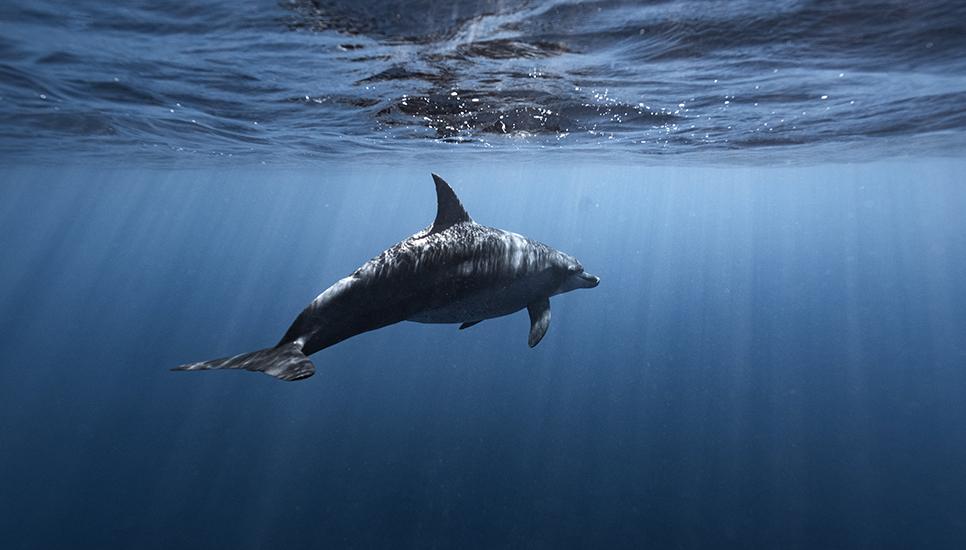Evamaria Zouppa: My mission to save dolphins from captivity

Where did your passion for dolphins and their wellbeing come from?
It started after I went swimming with dolphins in 1998 in Bermuda. Originally, the dolphins were held in the large and open Horseshoe Bay in Southampton. However, after a hurricane, two escaped and Dolphin Quest, which owned the dolphins, decided to have them transferred to a small, enclosed stone pool with green water at the Royal Naval Dockyard at the other end of the island.
When I went to visit them there, I was shocked! They were not whistling; they were swimming around in circles and they were numb because they didn’t have a large area to swim in. It was clear to see they were miserable. I was very sad for their suffering, but I didn’t know how I could help! Year later, when I was living in London, I decided to take action to help dolphins in captivity and unite people around their care.

How did My Dolphin Club come to be and what are its aims?
My Dolphin Club was the result of my passion for the dolphins and my inner need to help them. Although I was living in London at the time, I was looking to re-connect with my beloved dolphins and engage in something creative that would enable me to make a difference to the world.
Obviously, dolphins don’t have a voice. So, I decided to become their voice. I decided to speak to people about their issues and problems, to bring people closer to them, to educate them about their lives, to teach them about their abilities, to help the world love them and save them from our cruelty against them.
The mission of My Dolphin Club is “Free dolphins in clean oceans”, as, apart from dolphin captivity, ocean pollution is another area we tackle.
You established My Dolphin Club in the early days of Facebook, did the uptick in interest from fellow dolphin lovers surprise you?
Yes, a lot. People in the UK were particularly receptive, because My Dolphin Club was launched there in 2010. Now, it has an international set of followers.
Later on, when I moved to Athens and met the current editor, Marianna Karamanli, My Dolphin Club really took off. Marianna has addressed the Greek people, she primarily writes in Greek and she has reached 12,500 followers, as well as opening My Dolphin Club to X and Instagram. Currently, because of the popularity of the children’s book, The Rescue of Neravgi, we have also opened a TikTok account. Marianna has a gift for writing and she is a devoted and valuable member of My Dolphin Club.
Also, an essential part of the team is Evi Basiou, who is responsible for the organisation and planning of My Dolphin Club’s annual run. A group of friends each year participate in a charity run to raise awareness for dolphin protection – they, too, are an indispensable part of My Dolphin Club’s activity.

The Rescue of Neravgi is the first in a trilogy of children’s books focused on the plight of dolphins in captivity and the state of the oceans as a whole. What drove you to tell the story and how has it been received?
I have always wanted to reach children and teach them they can make a big difference. My friend Marie-Louise Solakian came up with the idea of a fairy tale. She said, “Why don’t you write a children’s book about dolphins?” I can introduce you to my friend Elpida Minadaki, who is a children’s book writer.” So, that’s how it all began.
It has been received very well. Children love it. I especially enjoy the book presentations to elementary schools all over Greece. They love the audio with dolphin sounds and the exercises in the back of the book. Elpida is a fantastic writer, she took my idea, research and story and put it into children’s language.

What impact has My Dolphin Club and your own advocacy had on dolphins forced to live in captivity?
Apart from education, information and awareness to the public, we have participated in protests against the Dolphinarium in Athens, we have produced TV clips for the general public, we make presentations to children’s schools, we have fought lawsuits and won and, more recently, we are fighting to take the nine dolphins from the Athens Dolphinarium into a sanctuary with the view to re-train them and potentially return them to the ocean. It is a very long, complicated and costly process but with the support of the local authorities and the other dolphin organisations, if we all get united, I believe we can succeed. I mention other dolphin organisations, because here in Greece, we all work together. We unite and present the government with a united front. Otherwise, they won’t listen to us.

Do you feel that education of the next generation is key to ensuring that all dolphins are ethically treated in the future?
Absolutely yes. They are the future for dolphins and the planet. I put all my hope onto them. As a generation, they are much more responsive and responsible. They already know it is not right that dolphins are held in dolphinariums and aquariums. Already in Greece, the Ministry of Education has issued a directive that advises parents to refrain from taking their children to zoos and aquariums.
The next generation is also learning about the importance of group work, activism and volunteer work, all of which are very important for the future wellbeing of our planet. We cannot simply rely on governments; we have to take matters into our own hands.
For more information on My Dolphin Club, click here.






